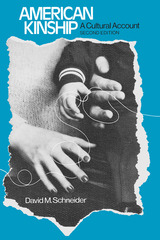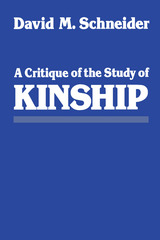3 books about Schneider, David M.

American Kinship
A Cultural Account
David M. Schneider
University of Chicago Press, 1980
American Kinship is the first attempt to deal systematically with kinship as a system of symbols and meanings, and not simply as a network of functionally interrelated familial roles. Schneider argues that the study of a highly differentiated society such as our own may be more revealing of the nature of kinship than the study of anthropologically more familiar, but less differentiated societies. He goes to the heart of the ideology of relations among relatives in America by locating the underlying features of the definition of kinship—nature vs. law, substance vs. code. One of the most significant features of American Kinship, then, is the explicit development of a theory of culture on which the analysis is based, a theory that has since proved valuable in the analysis of other cultures. For this Phoenix edition, Schneider has written a substantial new chapter, responding to his critics and recounting the charges in his thought since the book was first published in 1968.
[more]

A Critique of the Study of Kinship
David M. Schneider
University of Michigan Press, 1984
Schneider challenges the assumptions on which anthropology has depended for the last century by showing that one of the major categories in terms of which social life has been understood is largely untenable. The idea of kinship is subject to penetrating scrutiny. Unlike the proverbial Emperor, it is not that kinship has no clothes. The question is whether there is anything at all underneath those clothes. And even when the clothes appear to be shreds and patches held together by a web of illusions.
The critique uses a novel device in that the same set of ethnographic “facts” are looked at through different theories. This reveals a good deal about the different theories. By the same token, of course, this critique goes into the question of what a “fact” of “kinship” might be and how to recognize one either at home or in the field.
Schneider’s critique also uses history to raise cogent questions about how kinship has been studied. But it is not as 20/20 hindsight that history is used. Due respect is paid to the climate of the time, as well as the climatic changes and the ways in which these helped to create the emperor’s clothes. Right, wrong, or indifferent, Schneider’s study of how the emperor “kinship” was dressed and then redressed as the winds of change threatened disarray, proves challenging to the theories by which anthropology lives, as well as to the specifically privileged domain of “kinship.” The implications of this study for a wide range of problems within theoretical anthropology are striking.
The critique uses a novel device in that the same set of ethnographic “facts” are looked at through different theories. This reveals a good deal about the different theories. By the same token, of course, this critique goes into the question of what a “fact” of “kinship” might be and how to recognize one either at home or in the field.
Schneider’s critique also uses history to raise cogent questions about how kinship has been studied. But it is not as 20/20 hindsight that history is used. Due respect is paid to the climate of the time, as well as the climatic changes and the ways in which these helped to create the emperor’s clothes. Right, wrong, or indifferent, Schneider’s study of how the emperor “kinship” was dressed and then redressed as the winds of change threatened disarray, proves challenging to the theories by which anthropology lives, as well as to the specifically privileged domain of “kinship.” The implications of this study for a wide range of problems within theoretical anthropology are striking.
[more]

Schneider on Schneider
The Conversion of the Jews and Other Anthropological Stories
David M. Schneider, as told to Richard Handler
Duke University Press, 1995
To listen to David M. Schneider is to hear the voice of American anthropology. To listen at length is to hear much of the discipline’s history, from the realities of postwar practice and theory to Schneider’s own influence on the development of symbolic and interpretive anthropology in the 1970s and 1980s. Schneider on Schneider offers readers this rare opportunity, and with it an engrossing introduction into a world of intellectual rigor, personal charm, and wit.
In this work, based on conversations with Richard Handler, Schneider tells the story of his days devoted to anthropology—as a student of Clyde Kluckhohn and Talcott Parsons and as a writer and teacher whose work on kinship and culture theory revolutionized the discipline. With a master’s sense of the telling anecdote, he describes his education at Cornell, Yale, and Harvard, his fieldwork on the Micronesian island of Yap and among the Mescalero Apache, and his years teaching at the London School of Economics, Berkeley, and the University of Chicago. Musing on the current state and the future of anthropology, Schneider’s cast of characters reads like a who’s who of postwar social science. His reflections on anthropological field research and academic politics address some of the most pressing ethical and epistemological issues facing scholars today, while yielding tales of unexpected amusement.
With its humor and irony, its wealth of information and searching questions about the state of anthropology, Schneider on Schneider not only provides an important resource for the history of twentieth-century social science, but also brings to life the entertaining voice of an engaging storyteller.
In this work, based on conversations with Richard Handler, Schneider tells the story of his days devoted to anthropology—as a student of Clyde Kluckhohn and Talcott Parsons and as a writer and teacher whose work on kinship and culture theory revolutionized the discipline. With a master’s sense of the telling anecdote, he describes his education at Cornell, Yale, and Harvard, his fieldwork on the Micronesian island of Yap and among the Mescalero Apache, and his years teaching at the London School of Economics, Berkeley, and the University of Chicago. Musing on the current state and the future of anthropology, Schneider’s cast of characters reads like a who’s who of postwar social science. His reflections on anthropological field research and academic politics address some of the most pressing ethical and epistemological issues facing scholars today, while yielding tales of unexpected amusement.
With its humor and irony, its wealth of information and searching questions about the state of anthropology, Schneider on Schneider not only provides an important resource for the history of twentieth-century social science, but also brings to life the entertaining voice of an engaging storyteller.
[more]
READERS
Browse our collection.
PUBLISHERS
See BiblioVault's publisher services.
STUDENT SERVICES
Files for college accessibility offices.
UChicago Accessibility Resources
home | accessibility | search | about | contact us
BiblioVault ® 2001 - 2024
The University of Chicago Press









